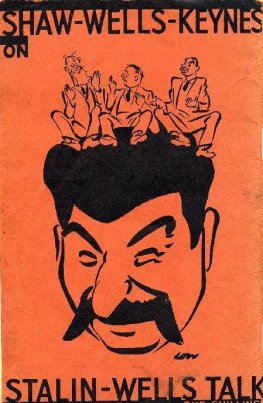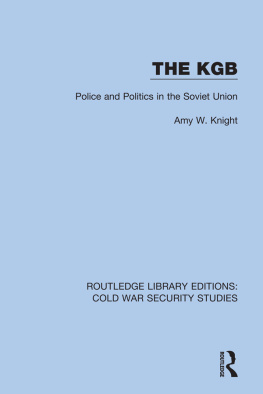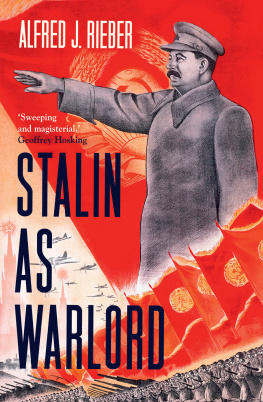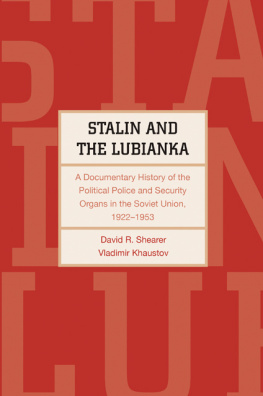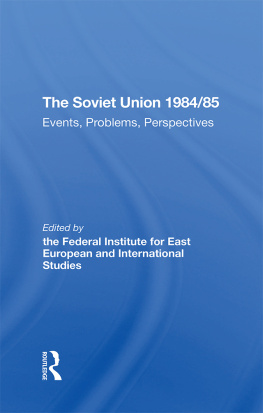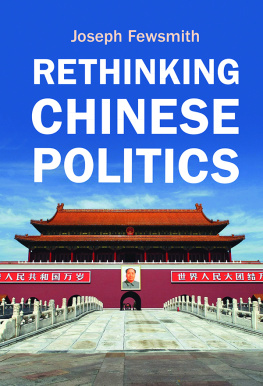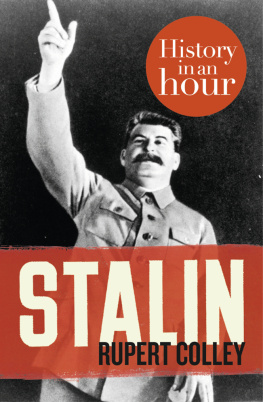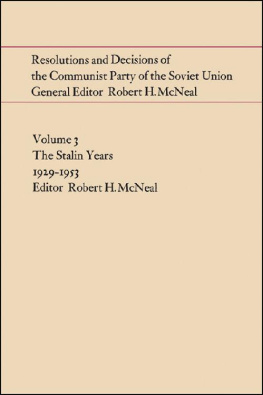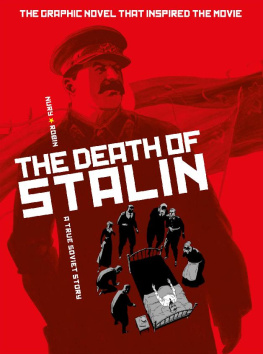PRESTIGE, MANIPULATION, AND COERCION
PRESTIGE, MANIPULATION, AND COERCION
Elite Power Struggles in the Soviet Union and China after Stalin and Mao
JOSEPH TORIGIAN
Yale UNIVERSITY PRESS
New Haven and London
Published with assistance from the foundation established in memory of James Wesley Cooper of the Class of 1865, Yale College.
Copyright 2022 by Yale University and the Board of Trustees of the Leland Stanford, Jr. University.
All rights reserved.
This book may not be reproduced, in whole or in part, including illustrations, in any form (beyond that copying permitted by Sections 107 and 108 of the U.S. Copyright Law and except by reviewers for the public press), without written permission from the publishers.
Yale University Press books may be purchased in quantity for educational, business, or promotional use. For information, please e-mail (U.K. office).
Set in Janson Text type by Newgen North America, Austin, Texas.
Printed in the United States of America.
Library of Congress Control Number: 2021945449
ISBN 978-0-300-25423-5 (hardcover : alk. paper)
A catalogue record for this book is available from the British Library.
This paper meets the requirements of ANSI/NISO Z39.48-1992
(Permanence of Paper).
10 9 8 7 6 5 4 3 2 1
For my Mom and Dad
Contents
Acknowledgments
This is a book about elite politics in the Soviet Union and China after the deaths of Iosif Stalin and Mao Zedong. For a topic like this one, the world files its information miscellaneously. Scholars cannot simply go to one single set of archives, collect the relevant material, and write up what they find. Instead, the research is more about luck and the people who help you find more evidence and teach you how to interpret it. Simply put, this book is the result of funding that gave me the deep time to discover and digest new sources and the people who guided me.
I am deeply grateful to my dissertation committee of Richard Samuels, Kathleen Thelen, Taylor Fravel, and Barry Posen. During my time at Massachusetts Institute of Technology, I also benefited from conversations about my work with Roger Petersen, Suzanne Berger, Francis Gavin, Fotini Christia, and Stephen Van Evera. Thank you to my colleagues who read segments of the dissertation or listened to me present: Mark Bell, Chris Clary, James Conran, Fiona Cunningham, Jeremy Ferwerda, Toby Harris, Chad Hazlett, Sameer Lalwani, Austin Long, Kacie Miura, Rachel Odell, Andrew Radin, Josh Shifrinson, Peter Swartz, David Weinberg, and Alec Worsnop. The Center for International Studies at MIT and an MIT International Science and Technology Initiatives China Seed Funds Program supported two trips to China.
The Institute for Security and Conflict Studies at George Washington University was a very welcoming home for a year. Comments from Stephen Biddle, Alexander Downes, Charles Glaser, Harris Mylonas, Janne Nolan, Elizabeth Saunders, and Jane Vaynman were very important at an early stage of the project.
The Center for International Security and Cooperation at Stanford provided funding for two years to work on this book. My advisers David Holloway, Tom Fingar, Amir Weiner, and Andrew Walder all had a major impact on how the project developed. Thank you also to Jennifer Erickson, Kate Cronin-Furman, Lynn Eden, Ashley Fabrizio, Edward Geist, Morgan Kaplan, Chris Lawrence, Andreas Lutsch, Anna Pczeli, Terrence Peterson, Farzan Sabet, Scott Sagan, Nina Silove, Rochelle Terman, Gil-li Vardi, Anna Weichselbraun, Amy Zegart, and Katarzyna Zysk.
Thank you to the Princeton-Harvard (now Columbia-Harvard) China and the World Program for a year at Princeton. The project has played a crucial role developing a new generation of China scholars. Thank you to Tom Christensen, Iain Johnston, Maria Adele Carrai, Andrew Chubb, and Yeling Tan for this opportunity.
The School of International Service at American University has provided a wonderful intellectual home for me. I am deeply grateful to so many colleagues for their support: Boaz Atzili, Claire Brunel, Chuck Call, Susanna Campbell, Lauren Carruth, Christine Chin, Elizabeth Cohn, Ken Conca, Audrey Kurth Cronin, Keith Darden, Michelle Egan, Daniel Esser, Anthony Fontes, Carole Gallaher, James Goldgeier, Louis Goodman, Hrach Gregorian, Austin Hart, Patrick Jackson, Miles Kahler, Ji-Young Lee, Nanette Levinson, Garret Martin, Malini Ranganathan, Joshua Rovner, Mike Schroeder, Judy Shapiro, Susan Shepler, Sarah Snyder, Megan Stewart, Matthew Taylor, Sharon Weiner, Nina Yamanis, Yang Zhang, and Quansheng Zhao. A Dean of Academic Affairs International Travel Award allowed for a final two-month trip to China for interviews and collecting material.
Thank you to the librarians and archivists who made this research possible: Jing Zhong and Yan He at the GW Asia Library; Svetlana Savranskaya at the National Security Archive; Hugh Truslow at the Harvard Fung Library; Xiao-he Ma at the Harvard Yenching Library; Harold Leich at the Library of Congress; Richard Siao and Hong Cheng at UCLA; Haihui Zhang and Xiuying Zou at the University of Pittsburgh; Zhaohui Xue at Stanford; and all the archivists at Russian State Archive of Contemporary History (RGANI), Russian State Archive of Sociopolitical History (RGASPI), Archive of the Foreign Policy of the Russian Federation (AVP RF), and Russian State Military Archive (RGVA). Nancy Hearst at the Harvard Fung Library deserves a very special mention for her advice and help over the years. She graciously helped ensure the accuracy of my notes. Thank you to Joshua Seufert at Princeton University for keeping me updated on so many wonderful new sources and for working so hard to make the Princeton collection one of the best in the world.
This book would not have been possible without the Wilson Centers Cold War International History Project. Christian Ostermann and Chuck Kraus have provided an extraordinary service to the academic community. Sergey Radchenko shared crucial documents from the Hubei Provincial Archives that allowed the revisionist history in this book to happen.
Every conversation I have with Chung Yen-lin feels like a single word is worth a thousand pieces of gold, yet there is always something else to discuss. Thanks for being a zhiji. A very, very special thank you must be extended to Warren Sun and Frederick Teiwes. They saved me from some real howlers in the China chapters and shared some crucial documents. They set the bar for the study of elite politics in China and are my models. Enormous thanks.
To a significant extent, this book is a work of translation. If not for the help and research of numerous Chinese and Russian scholars, this research project would be impossible. Thank you in particular to Iuliia Abramova, Iurii Aksiutin, Chen Donglin, Cheng Xiaonong, Han Gang, Hao Jian, Ho Pin, Hu Ping, Oleg Khlevniuk, Li Danhui, Li Haiwen, Li Nanyang, Li Shengping, Lin Yunhui, Lu Lilin, Niu Jun, Mikhail Prozumenshchikov, Shen Zhihua, Wang Haiguang, Wu Si, Xiao Donglian, Xu Qingquan, Xu Youyu, Yang Jisheng, Zhang Boshu, and many others. All mistakes in this book remain my own.
The person who has spent the second most amount of time contributing to this book is my dear friend Anna Pan. I have probably learned most of the Russian I know from her, even though I still often cannot seem to get the soft sign to come out correctly.
This book benefited from the numerous opportunities to present its findings to different audiences: the Princeton-Humboldt Comparing Dictatorships in Transition Conference; the Tianwen Lianhe Society Cultural Revolution Museum Preparatory Committee; the Association for Asian Studies; the Association for Slavic, East European, and Eurasian Studies; the International Studies Association; the East China Normal University History Department; and Hoover Institution Workshop on Authoritarian Regimes.


